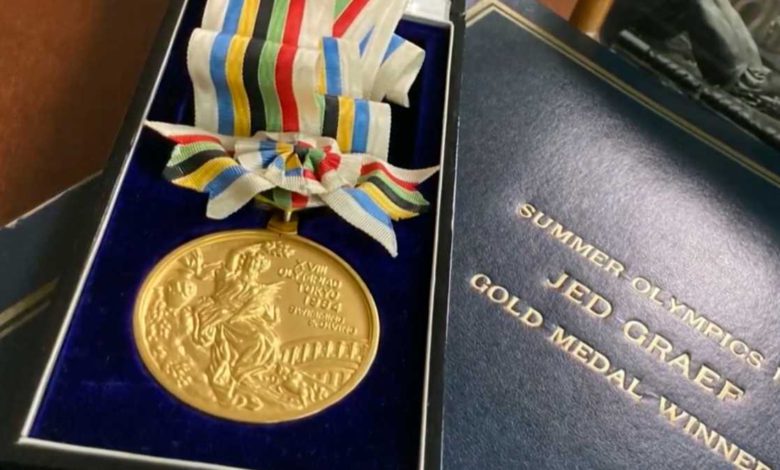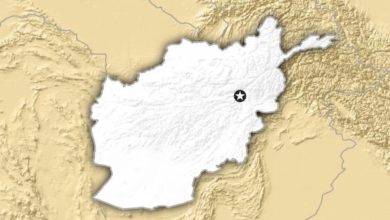
well the cellar summer olympics are 100 days away and the Games are returning to Tokyo for the first time since 1964. NBC fires marshall Krimsky joining us live with a story about a Vermont man who is no stranger to swimming to the top of the olympic podium. Marshall. The last time the olympic games were in Tokyo, where in 1964 Shelburne resident Jed Graf won the gold medal for the 200 m backstroke despite the Games taking place 57 years ago. Graff remembers every moment and movement from his strokes. In Tokyo, I had probably my best start. I mean I was gone with the gun. That was pretty much the race right there. On just the third day of the 1964 summer olympics in Tokyo. American swimmer. Jed graph made history easily. It was actually harder to make the team than to make the finals in Tokyo just because we were so dominant, proven by a final touch of the pad and a look up at the leaderboard. I saw next to my name that said A one and and N. W. For new world record, a world record meant a gold medal followed by a U. S. A sweep of the 200 m backstroke that's me with my arms up High in the center to the right of me, you'll see Gary Dilley with his hands still on the blocks, he took second by 2/10 of a 2nd. 2/10 is about like that. And I had noticed whenever he did a start on the go, he would pull himself up and then release. He was giving away time. That actually is why I won the race and I've sort of felt mildly guilty sort of conflicted about it over the years that I didn't tell him about it. I mean, it was a glaring flaw divided in the pool by lanes you define on the podium by flag. That's sort of right after the race. The two were joined by an american teammate and bronze medalist bob Bennett, amazingly emotional experience. Just standing there for that ceremony. Once graph was etched into olympic history in his lone event. To him, the more meaningful part again to me, the fondest memory is living in the olympic village. I mean that was height of Cold War, but you've got five athletes from all over the world. None of them care about politics, Everybody talks to each other and just a really nice experience. The world was a lot different than yet. The advice graph gives the gold medal hopefuls still rings true. It's really just a matter of maintaining that focus and uh, not, not get distracted focus plus good timing could equal sports immortality grab can tell olympic stories for hours beyond his event. For example, two time NBA champion, his former Princeton classmate and former american senator Bill Bradley actually helped graft sneak into the team USA basketball game against the soviet Union. On the american basketball teams. Way to their own gold medal in Tokyo 57 years later, restrictions and security might be a little bit stricter reporting live in Williston on the road to the Tokyo Tokyo Olympics. Marshall Krimsky, NBC five News. Mhm. Marshall Great Story.
'Amazingly emotional experience': 1964 Olympic gold medalist recounts his race in Tokyo Games
The Summer Olympics are fast approaching. The games are returning to Tokyo for the first time since 1964. Jed Graef from Vermont won a gold medal in the 200-meter backstroke in the 1964 Olympics. Despite the games taking place 57 years ago, Graef remembers every moment, and movement, from his race for gold. "I had probably my best start, I was gone with the gun...that was pretty much the race right there on the start," Graef said. On just the third day of the 1964 Summer Olympics in Tokyo, Graef, an American swimmer, made history."It was actually harder to make the team than to make the finals in Tokyo just because we were so dominant," Graef said.Proven by a final touch of the pad, and a look up at the leaderboard. "I saw next to my name, I saw a ‘1’ and an ‘NW’ for ‘New World Record,’" Graef said.A world record, meant a gold medal – followed by a USA sweep of the 200-meter Backstroke. Graef defeated Silver Medalist Gary Dilley by two-tenths of a second."Now two-tenths is about 'tap tap,' I had noticed after we started training together out in Palo Alto after the Olympic trials, whenever he did a start on the go, he would pull himself up and the go on the release. He was giving away time on that, I sort of felt mildly guilty over the years that I didn’t tell him about it, I mean it was a glaring flaw," Graef said.Divided in the pool by lanes, unified on the podium by the flag., the two were joined by American teammate and Bronze Medalist Bob Bennett. "That was right after the race, this is the three of us," Graef said. "An amazingly emotional experience standing there for that ceremony."Once Graef was etched into Olympic history in his lone event, to him, the more meaningful part began."To me the fondest memory is living in the Olympic Village, that was the height of the Cold War, but you got 5,000 athletes from all over the world, nobody cares about politics," Graef said.The world was a lot different then. Yet the advice Graef gives to gold medal hopefuls still rings true."It’s really just a matter of maintaining that focus and not getting distracted," Graef said.
The Summer Olympics are fast approaching. The games are returning to Tokyo for the first time since 1964.
Jed Graef from Vermont won a gold medal in the 200-meter backstroke in the 1964 Olympics. Despite the games taking place 57 years ago, Graef remembers every moment, and movement, from his race for gold.
"I had probably my best start, I was gone with the gun...that was pretty much the race right there on the start," Graef said.
On just the third day of the 1964 Summer Olympics in Tokyo, Graef, an American swimmer, made history.
"It was actually harder to make the team than to make the finals in Tokyo just because we were so dominant," Graef said.
Proven by a final touch of the pad, and a look up at the leaderboard.
"I saw next to my name, I saw a ‘1’ and an ‘NW’ for ‘New World Record,’" Graef said.
A world record, meant a gold medal – followed by a USA sweep of the 200-meter Backstroke. Graef defeated Silver Medalist Gary Dilley by two-tenths of a second.
"Now two-tenths is about 'tap tap,' I had noticed after we started training together out in Palo Alto after the Olympic trials, whenever he did a start on the go, he would pull himself up and the go on the release. He was giving away time on that, I sort of felt mildly guilty over the years that I didn’t tell him about it, I mean it was a glaring flaw," Graef said.
Divided in the pool by lanes, unified on the podium by the flag., the two were joined by American teammate and Bronze Medalist Bob Bennett.
"That was right after the race, this is the three of us," Graef said. "An amazingly emotional experience standing there for that ceremony."
Once Graef was etched into Olympic history in his lone event, to him, the more meaningful part began.
"To me the fondest memory is living in the Olympic Village, that was the height of the Cold War, but you got 5,000 athletes from all over the world, nobody cares about politics," Graef said.
The world was a lot different then. Yet the advice Graef gives to gold medal hopefuls still rings true.
"It’s really just a matter of maintaining that focus and not getting distracted," Graef said.
Source link










